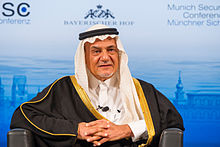Prince Turki’s Blunt Message to Washington: Only Assad’s Ouster Can Defeat the Islamic State
Middle East Briefing/November 03/14
Prince Turki bin-Faisal, the former long-time head of the Kingdom of Saudi Arabia’s Foreign Intelligence Directorate and the brother of the current foreign minister, delivered a blunt warning to the Obama Administration in a speech in Washington on October 28. Addressing the annual meeting of the National Council on US-Arab Relations (NCUSAR), Prince Turki warned that the only way to defeat the Islamic State was for the United States to launch air strikes to bring down the Assad government.
Prince Turki spelled out a precise plan for the removal of the Assad government, starting with the US bombing campaign, which had been originally planned for September 2013, but was cancelled at the last moment by President Obama under pressure from both the Joint Chiefs of Staff and the American people. When President Obama announced that he was delaying the attack orders to first consult with Congress, an outpouring of public opposition to another American war in the Arab-Muslim world led to the cancellation of the plans. At the time, there were as many as 75 high-value regime targets on the list of sites to be bombed. Both President Obama and Secretary of State John Kerry had told the Saudis and other regional allies that the bombing campaign was imminent, and the cancellation has been a source of continued friction between Washington and the Gulf Cooperation Council (GCC) states ever since.
Prince Turki demanded the immediate creation of no-fly zones along the Syrian borders with Turkey and Jordan and the establishment of a credible government led by the Syrian Coalition Council on that Syrian territory. While he paid lip service to the idea of including elements of the Assad government “with no blood on their hands” in the new national reconciliation government, he made clear that Assad and the entire top leadership of the government and the armed forces would have to be removed.
The Prince harshly criticized the Obama Administration for ignoring Saudi demands to arm the moderate opposition for more than three years, which has resulted in the rise of the Islamic State and other extremist elements including the al-Qaeda-linked al-Nusra Front.
Prince Turki described IS and the Nusra Front as “symptoms” of a deeper disease that had to be rooted out to solve the jihadist threat. He identified the “disease” as the role of Iran in supporting Shi’ite insurgencies throughout the region and in defending the Assad government. He detailed Iran’s backing for Hezbollah and its own Iranian Revolutionary Guard Corps Al Quds Brigade in preventing the overthrow of Assad, and charged that Iran is secretly supporting the formation of Hezbollah-type Shi’ite militias in Bahrain and Yemen.
He also scored Iran for its role in backing former Iraqi Prime Minister Nouri al-Maliki in his suppression of the Sunni minority, and charged that Iran had blocked American engagement against the Islamic State inside Iraq on the grounds it infringed on Iraq’s sovereignty, while the Al Quds Brigade operated freely inside Iraq.
The Prince referenced previous speeches he delivered before the NCUSAR over the past three years, in which he warned that the carnage would spread from Syria into neighboring countries including Lebanon, Israel, Jordan, Turkey, Iraq and Israel unless the anti-Assad forces were sufficiently armed to “level the playing field.” “If the United States and Europe had listened to the Kingdom’s demands to arm the Syrian rebels three years ago,” he told the audience, we would not be facing the IS threat today.
Prince Turki’s message was not universally embraced in Washington. Earlier in the day, in a lengthy address to the NCUSAR conference, former US Ambassador to Saudi Arabia Chas Freeman had called for unified Arab and Muslim leadership role to defeat the Islamic State. He called upon all Muslim states of the region—both Sunni and Shi’ite—to join forces to defeat the Islamic State and allied jihadists, warning that the alternative to this united effort was a new Thirty Years War that would engulf the entire Islamic world, leading to generations of chaos. Freeman harshly criticized successive American administrations for destroying the fragile stability in the region, starting with the 2003 invasion of Iraq and the overthrow of Saddam Hussein, warning that outside powers could not defeat IS unless and until there was a reconciliation and alliance among all the Muslim states of the region to defeat the common enemy at the military and ideological level.”.




















